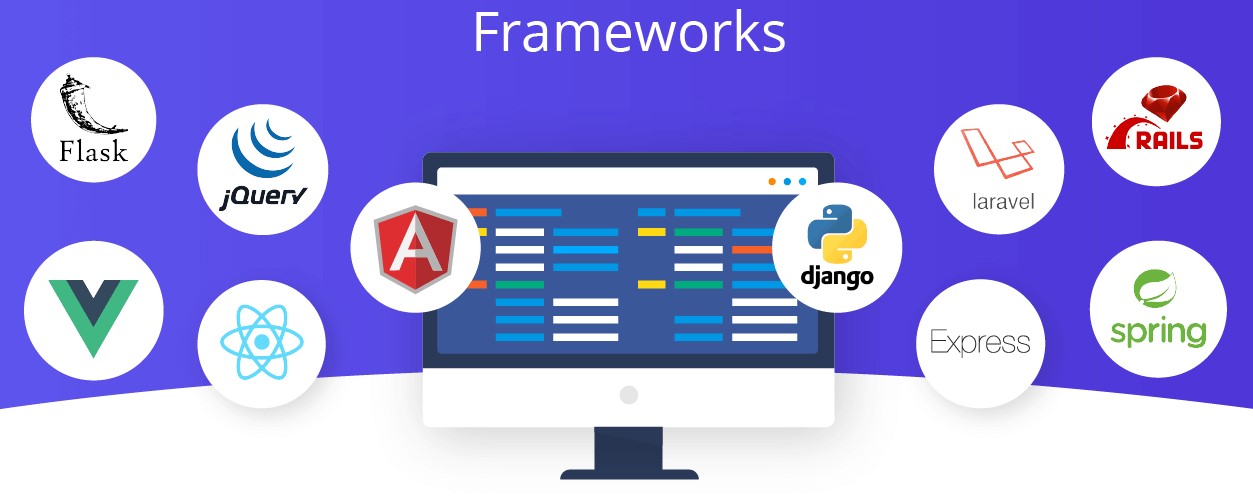10 Best Web Development Frameworks to Use in 2023
In the ever-evolving world of web development, staying up-to-date with the latest frameworks is crucial for developers. Web frameworks provide a solid foundation and streamline the development process, allowing developers to build robust and efficient web applications. With a multitude of options available, it can be challenging to choose the right framework to learn. In this blog post, we will explore some of the best web frameworks worth learning in 2023, based on their popularity, community support, and industry demand.
React.js
React.js has been a dominant player in the web development landscape for several years now. Developed by Facebook, React.js is a JavaScript library that allows developers to build reusable UI components for creating dynamic and interactive user interfaces. With its virtual DOM implementation, React.js enables efficient rendering, resulting in fast and responsive applications. React’s component-based architecture and extensive ecosystem, including tools like Redux and Next.js, make it a popular choice for building modern web applications.
Angular
Angular, developed by Google, is a comprehensive and feature-rich framework for building large-scale web applications. It provides a complete solution, including a powerful templating system, two-way data binding, dependency injection, and a robust testing framework. Angular follows the Model-View-Controller (MVC) architectural pattern, making it suitable for complex applications that require a structured and scalable approach. It also offers features like Angular Universal for server-side rendering and Angular Material for pre-built UI components.
Vue.js
Vue.js has gained significant traction in recent years due to its simplicity and versatility. It is a progressive JavaScript framework that can be incrementally adopted to power different parts of an application. Vue’s reactive data binding and component-based architecture make it easy to build intuitive user interfaces. Its gentle learning curve and excellent documentation make it a popular choice for beginners and experienced developers alike. Vue also offers ecosystem tools such as Vue Router and Vuex for routing and state management.
Django
Django, a high-level Python web framework, emphasizes rapid development, clean design, and pragmatic principles. It follows the Don’t Repeat Yourself (DRY) philosophy and includes built-in features such as an ORM (Object-Relational Mapping) for database management, an admin interface, and robust security measures. Django’s batteries-included approach enables developers to focus on the application’s logic rather than boilerplate code. Its strong community support and extensive documentation make it an excellent choice for Python developers.
Laravel
Laravel, a PHP web framework, has gained immense popularity for its elegant syntax, expressive features, and developer-friendly ecosystem. It follows the Model-View-Controller (MVC) architectural pattern and provides features like routing, caching, authentication, and ORM support out of the box. Laravel’s artisan command-line tool automates repetitive tasks and simplifies the development process. With its active community and comprehensive documentation, Laravel offers a productive environment for building modern PHP applications.
Exploring the PMBOK Methodology: A Comprehensive Guide to Project Management Success
Express.js
Express.js is a minimalist web application framework for Node.js. It provides a simple and flexible way to build web applications and APIs. With its lightweight nature, Express.js allows developers to quickly create server-side logic and handle routing. It also has a vast middleware ecosystem, enabling developers to add functionality such as authentication, logging, and error handling easily. Express.js is an excellent choice for developers who prefer a lightweight framework and want to leverage the power of Node.js for building scalable web applications.
Ruby on Rails
Ruby on Rails, often referred to as Rails, is a popular web framework written in Ruby. It follows the convention-over-configuration principle, which means developers can focus on writing application code rather than configuring files. Rails emphasizes developer productivity and provides a wide range of built-in features such as an ORM (Active Record), routing, caching, and scaffolding. Its strong emphasis on convention and its supportive community make it an excellent choice for building web applications with Ruby.
ASP.NET
ASP.NET is a mature web framework developed by Microsoft. It enables developers to build robust and scalable web applications using languages like C# and Visual Basic. ASP.NET provides a comprehensive set of tools and libraries, including ASP.NET MVC for building model-view-controller applications, Web API for building RESTful services, and ASP.NET Core for cross-platform development. With its integration with the .NET ecosystem, ASP.NET offers a powerful framework for enterprise-level web development.
Spring Boot
Spring Boot, built on top of the popular Spring framework for Java, aims to simplify the development of Java-based web applications. It provides an opinionated approach to configuration, making it easier to set up and deploy applications quickly. Spring Boot offers a wide range of features, including dependency injection, auto-configuration, and built-in support for database integration, REST APIs, and security. Its robust ecosystem and community support make it a preferred choice for Java developers.
Flask
Flask is a lightweight and flexible web framework for Python. It follows a minimalist approach, providing developers with the essential tools needed for web development without imposing any rigid structure. Flask is easy to learn and allows developers to have fine-grained control over their application. It is often used for building small to medium-sized web applications and APIs. Flask’s simplicity and extensibility make it a popular choice for developers who value flexibility and minimalism.
Choosing the right web framework is crucial for developers to stay competitive in the fast-paced world of web development. The frameworks mentioned in this blog post, including React.js, Angular, Vue.js, Django, and Laravel, have proven their worth in terms of popularity, community support, and industry demand. Whether you prefer JavaScript, Python, or PHP, these frameworks offer the necessary tools and features to build robust and efficient web applications. Remember to consider your project requirements, community support, and personal preferences when selecting a web framework to learn. Happy coding!

